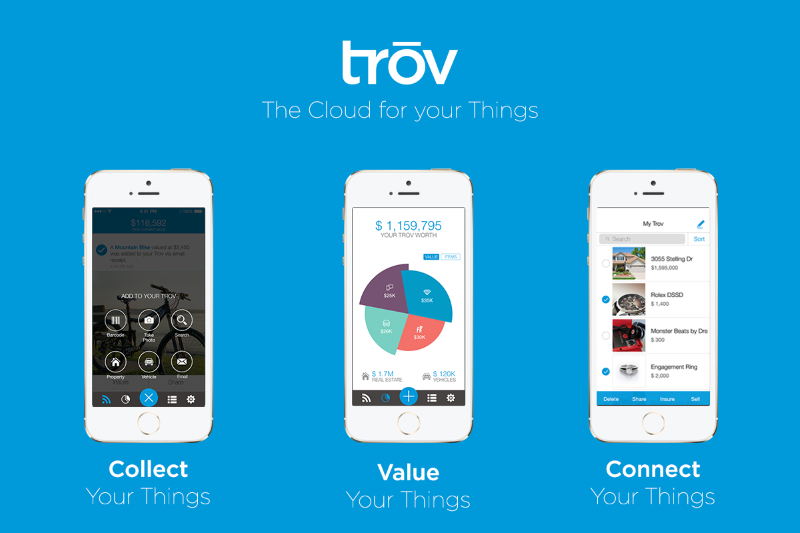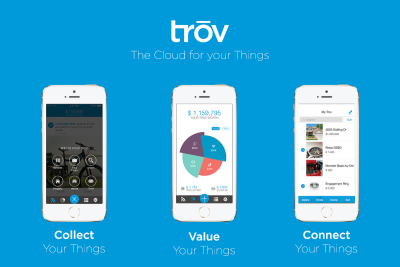
Trov Quantify Your Stuff
While the quantified self movement is picking up steam, there have been certain aspects left out. One of these has less to do with the “self” and more to do with “stuff.” We just came across an interesting new startup that wants to help you quantify all of your stuff. Trov is an app that acts as a sort-of cloud-based inventory of all your stuff. Trov allows you to quantify all of the things you own, and provides you with a market value for all of this stuff. We had a chance to ask the team a few questions about their new app:
Trov
What is Trov?
Trov helps people track the value of everything they own, so that they can do more with it. Through integrations with world leading product databases and marketplaces, Trov automatically collects important information about people’s things and then securely organizes it in their own personal Trov. All of this information, including current market values, receipts and insurance, is then quickly accessible from anywhere at any time on a mobile device. Users can then take advantage of unique opportunities with their things, such as selling, insuring and sharing, directly from their Trov.
Who is your target user?
Currently, Trov has two primary audiences: 1) people who take an active interest in tracking their finances and 2) uber-organizers who are keen to keep track of all the information about their things, like receipts and insurance.
What problem is Trov taking on?
Everything in the world is quickly becoming digitized, but the things people own have yet to be connected in an effective way. As a result, people’s things are very unorganized and most people have little idea what their stuff is worth. Trov is a cloud-based mobile app that houses all the information about the things people own and provides timely updates on their market values. With this information only a few taps away, people can do more with their things, like more effective selling, insuring and sharing.

How is your product different from what is currently available?
There are dozens of apps out there that help people create an inventory of the things they own, but they differ from Trov in two major ways. First, Trov makes it ridiculously easy (and automatic) to get all the information about things into a Trov, including features like barcode scanning, email receipt sync, product search and more. Secondly, Trov is the only application that provides up-to-date market values of the things people own, which helps people make timely decisions about their things.
Tell us your founding story. Was there an “ah ha” moment?
In 2010, Trov Founder Scott Walchek, realized that everything in the world is getting more digital and connected, but people’s things remain massively disconnected and fragmented. Furthermore, for the first time in history, Credit Suisse reported that global household wealth was made up of 50% financial assets (cash and equivalents), and 50% non-financial (personal and real property). With half of the world’s wealth wrapped up in people’s things and no easy way to effectively leverage it, Scott saw a huge opportunity to fill this void. Thus, the birth of Trov – the cloud for your things.
Tell us about your founding team and their backgrounds.
The executive team was formed in 2012 and composed of Scott Walchek as CEO, Jim Gemmell, of Microsoft Research and author of ‘Your life Uploaded’, as CTO and Mark Dowds as EVP of Business Development. Scott is an entrepreneur and has had global success in interactive media and has a long history of success with startups, including being a founding management member of Macromedia (acquired by Adobe), CEO of Sanctuary Woods, co-founder and CEO of C2B Technologies (acquired by Inktomi/Yahoo), founding director of Baidu, China’s dominant internet search engine, and Chairman and CEO of DebtMarket (acquired by Intercontinental Exchange).
What’s the next step? What are your short-term goals?
Trov is currently in public beta on iPhone in the US only. Over the next 12 months, Android and desktop versions will be released as well as expansion into global markets, including the UK and Australia.

